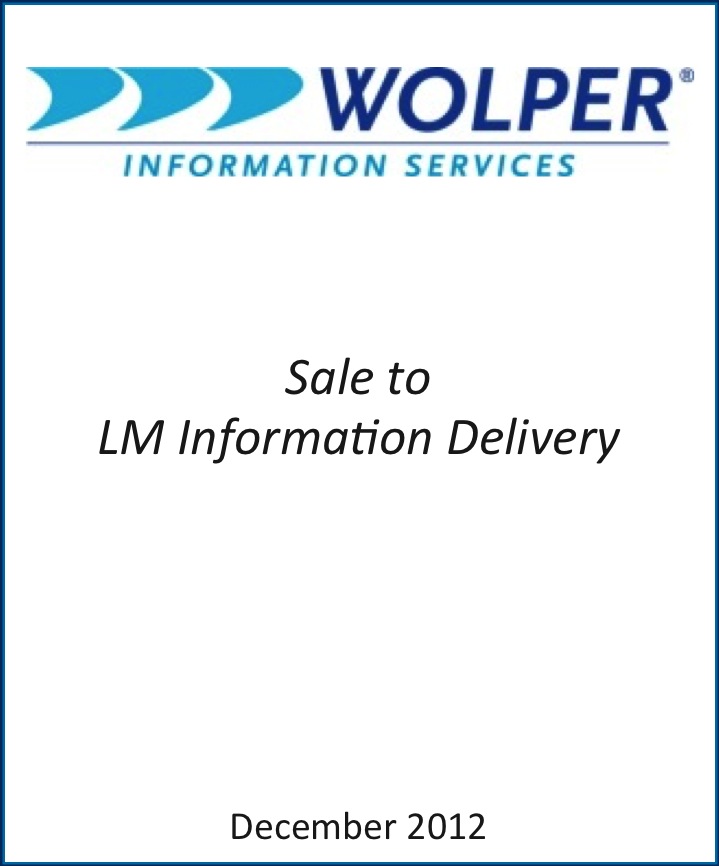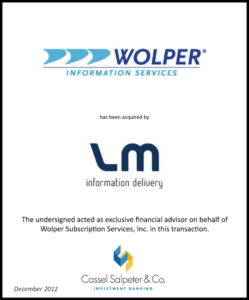James Cassel to Speak at ‘The Middle Market: Our World of Opportunity’
MIAMI – Dec. 21, 2012 – James Cassel, co-founder of Cassel Salpeter & Co., an independent investment banking firm that provides advice to middle-market and emerging growth companies in the U.S. and worldwide, will serve as a panelist in January at “The Middle Market: Our World of Opportunity in 2013” conference, sponsored by The Alliance of Merger & Acquisition Advisors (AM&AA) and The CFO Alliance. Cassel’s roundtable presentation, “Middle Market Update,” will focus on the current status of and emerging trends in middle-market mergers and acquisitions and will take place from 9:15 a.m. to 10:30 a.m. Wednesday, January 16, at the Hilton Miami Downtown, located at 1601 Biscayne Boulevard, Miami, Fla., 33132.
The conference will feature leading middle-market financial and strategic investors and advisors from around the world who will provide insights into the opportunities awaiting middle-market dealmakers in 2013. The panel is comprised of middle-market M&A industry professionals with extensive experience in the current M&A market and the areas of private equity, investment banking, lending, and data and research. Cassel and fellow panelists will discuss topics including: recent activity; current trends in valuation, leverage, restructuring and deal flow; and predictions on market activity for 2013. Moderated by Graeme Frazier with Private Capital Research/GF Data, the panel also includes: Randy Lampert, with Lampert Debt Advisors; Ken Jones, with Boathouse Capital; and Daniel Confino, with MergerID.
“While most middle-market business owners have been postponing any major business decisions until they’re seeing more clarity and confidence that the U.S. government can execute an effective plan for sustainable growth, they would be wise to begin considering now how to best position their companies for emerging challenges and opportunities as M&A activity begins to increase in 2013,” said Cassel, one of Miami’s best-known investment bankers. “Success in today’s market is all about staying ahead of the trends and working with trusted advisors to develop custom-tailored strategic plans to meet your unique business needs. Those who do can gain a tremendous competitive advantage.”
Nationally recognized for his investment banking expertise and a contributing columnist for The Miami Herald, Cassel frequently lectures on timely issues related to middle-market investment banking. Cassel has successfully negotiated, structured, and executed a broad spectrum of transactions including mergers, acquisitions, and divestitures, corporate and transactional financings, and public offerings for clients nationwide and worldwide. He has extensive experience developing financial restructuring plans, negotiating with creditors, and guiding debtors through bankruptcy proceedings.
About the Alliance of Merger & Acquisition Advisors (AM&AA)
The Alliance of Merger & Acquisition Advisors (AM&AA) is noted as the premier international organization serving the educational and resource needs of the middle market M&A profession. The Alliance of Merger & Acquisition Advisors® (AM&AA) is the premiere International Organization serving the educational and resource needs of the middle market M&A profession. Formed in 1998 to bring together Investors, Advisors and other Middle Market Transaction Professionals, AM&AA’s 900+ professional services firms in 22 countries – including some of the most highly recognized leaders in the industry—draw upon their combined transactional expertise to better serve the needs of their middle market clients worldwide. AM&AA members represent sellers and buyers of businesses ranging from $5 to $500 million in transaction value. Their services are seller representation, buyer representation, due diligence, accounting, financing, business valuation, tax planning, legal, strategic advisory, and many other transaction services. For more information, visit www.amaaonline.org or email info@amaaonline.org.
About Cassel Salpeter & Co.
Cassel Salpeter & Co. is an independent investment banking firm that provides advice to middle market and emerging growth companies in the U.S. and worldwide. Together, the firm’s professionals have more than 50 years of experience providing private and public companies with a broad spectrum of investment banking and financial advisory services, including: mergers and acquisitions; equity and debt capital raises; fairness and solvency opinions; valuations; and restructurings, such as 363 sales and plans of reorganization. Co-founded by James Cassel and Scott Salpeter, the firm provides objective, unbiased, results-focused services that clients need to achieve their goals. Personally involved at every stage of all engagements, the firm’s senior partners have forged relationships and completed hundreds of transactions and assignments nationwide. The firm’s headquarters are in Miami. Member FINRA and SIPC. More information is available at www.CasselSalpeter.com








